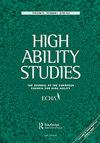社会与人才发展干预对高能力青少年社交技能困难的影响
IF 1.8
4区 教育学
Q2 EDUCATION, SPECIAL
引用次数: 10
摘要
摘要当代模式强调了在培养特定领域人才时培养认知和心理社会因素的必要性。该模型是当前研究的基础,在该研究中,有自我报告的社会困难的高能力青年(n=28,12名同时存在残疾)在为期两周的夏季强化计划中参与了社会技能和人才发展干预。与未参加社交技能干预的高能力青年(n=9)相比,参与者报告友谊品质(帮助)发生了积极变化,表明有治疗效果。据报道,在所有参与者中,友谊友谊和安全感发生了积极变化,这表明仅人才培养计划就对心理社会因素(友谊品质)产生了重大影响。对于社交技能组的人来说,表现接近目标定向的得分越高,友谊亲密度的变化得分越低,这表明如果一个人在学业上表现优于同龄人,这可能会对他们与同龄人建立密切联系的能力产生负面影响。本文章由计算机程序翻译,如有差异,请以英文原文为准。
The effects of a social and talent development intervention for high ability youth with social skill difficulties
Abstract Contemporary models highlight the need to cultivate cognitive and psychosocial factors in developing domain-specific talent. This model was the basis for the current study where high ability youth with self-reported social difficulties (n = 28, 12 with a coexisting disability) participated in a social skills and talent development intervention over the course of a two-week summer enrichment program. Compared to high ability youth not in the social skills intervention (n = 9), participants reported positive changes in friendship qualities (help), indicating a treatment effect. Among all participants, positive changes were reported in friendship companionship and security, suggesting the talent development program alone had significant impact on psychosocial factors (friendship qualities). For those in the social skills group, higher scores on performance approach goal orientations were related to lower change scores in friendship closeness, suggesting if one is driven academically to outperform peers, this may negatively affect their ability to form close ties with peers.
求助全文
通过发布文献求助,成功后即可免费获取论文全文。
去求助
来源期刊

High Ability Studies
Multiple-
CiteScore
4.80
自引率
11.10%
发文量
7
期刊介绍:
High Ability Studies provides a forum for scholars in a variety of disciplines associated with the development of human abilities to their highest level. It is a medium for the promotion of high ability, whether through the communication of scientific research, theory, or the exchange of practical experience and ideas. The contents of this journal are unique in reflecting concerns and recent developments in this area from childhood and across the whole life span in a variety of contexts. Far from being restricted to the traditional focus on high-level cognitive development, it also presents investigations into all other areas of human endeavour, including sport, technology, the arts, business, management and social relations.
 求助内容:
求助内容: 应助结果提醒方式:
应助结果提醒方式:


